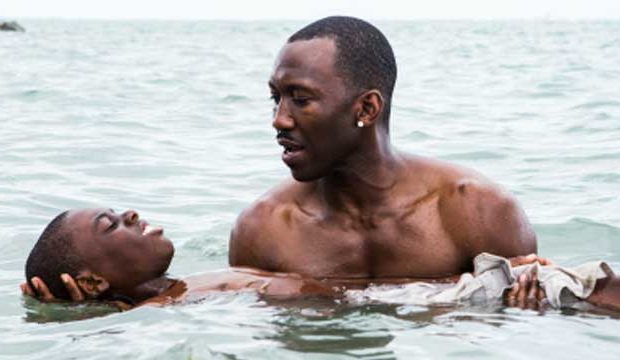At cinemas nationwide.
For a film based on a never-performed stage play, much of the raw power of Moonlight lies in what goes unspoken. So much is contained in a glance, a sentence curtailed or a close-up; all these little moments tell of emotions forced down and crushed in the heart until they become carbon. Consisting of three snapshots of the life of one man, Barry Jenkins has made a work of subtle, impressionistic detail that can only be pieced together by stepping back and contemplating it as a whole in the hours and days post-viewing.
Chiron is a boy growing up black and gay in Miami. Played at first by Alex Hibbert and nicknamed Little, he suffers bullying from classmates on account of his meekness and small stature, as well as emotional abuse from his crack-addled mother, Paula (Naomie Harris). He meets Juan, the local drug dealer (Mahershala Ali), who, along with his girlfriend Teresa (Janelle Monáe) shows him kindness and becomes a surrogate father figure. The bitter irony is, of course, that he provides the product that is destroying Little’s home life.
Chiron grows into an awkward, gangly teenage boy (Ashton Sanders), and then a muscle-bound dealer (Trevante Rhodes). Each incarnation is filled with a watchful, fractured intensity; each brimming with the bottled-up traumas and accumulated experiences that have occurred between the lines. The casting is immaculate. Chiron’s stoic silence helps with continuity between the actors, but there is so much depth brimming in the eyes of all three that the transition between the acts is completely convincing.
The film’s relative quiet is profoundly eloquent. It says much about the enforced masculinity in Chiron’s environment. In the tough economic situation of the modern Miami ghetto, brute strength is not only valued, but seen as essential to just survive. The shy, meek Chiron is victimised and bullied, his relatively ‘feminine’ characteristics used as a weapon against him as brutally as any fists. It’s the rare moments of kindness and tenderness, from Juan, Teresa, and a boy named Kevin that carve the biggest furrows in his personality. In the final act, Jenkins subverts the hyper masculinity that Chiron outwardly displays, in a tender scene of desperate sadness that enforces just how much his sexuality has contributed to his isolation.
Jenkins transcends and subverts cliches throughout. It helps when you have actors at the top of their game like Ali and Harris giving flesh and depth to otherwise standard roles like dealers and addicts. Even within the constraints of three clearly delineated acts, there is nothing easy or predictable to cling to; no grandstanding, no proselytising. There isn’t any real catharsis, but there is hope. Moonlight glows softly in the memory, unobtrusive but potent.
